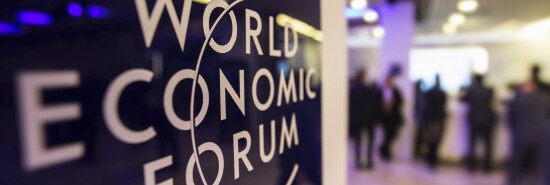
The rise and fall of Davos Man
Dominic Green
Conspiracy theories are the orderly consolations of a disordered mind. The greater the confusion of “narratives,” the greater the need for the clarity of a narrative arc. While popular subnarratives multiply through the internet, the meta-narrative of our times is being deflected and confounded. The overarching narrative of “progress” and the global triumph of American liberalism is not concluding in the 1990s dream of perpetual peace in a “flat” world. We are crash-landing in the harsh terrain of the Old World: Asian empires, broken borders, spheres of influence, and balances of power.
The age of Davos Man is over. This did not stop him from convening on a Swiss mountaintop for the World Economic Forum in January. Western business and political leaders will keep convening at Davos until the money runs out or until the WEF, like the dollar-denominated narrative it was designed to serve, completes its transition into something different and unexpected. An international body run to suit Asian, rather than Western, powers, for instance. That really would be a Great Reset.
AT DAVOS, FREE SPEECH IS THE ENEMY
Already, Western business and political leaders no longer bestride the world in that pitiful projection of corporate self-confidence, the “power stance.” They are on the back foot now. The West is pressed from without by Asian competition and riven within by what Karl Marx, who is always worth reading at times like this, called the “contradictions of capitalism.” The world is no longer buying what the West is selling, and the Western voters aren’t buying it either. Davos Man barricades himself inside the sterile zone atop the mountain, scuttles desperately through the snowy streets when a stunt journalist mugs him with a mic and camera, and mounts his private jet while telling us to turn off the heating and atone for the “climate crisis.”
Davos, notoriously, is where Thomas Mann set The Magic Mountain (1924), his fictional analysis of the middle-class society that went over the brink in 1914. The tubercular patients in the sanatorium above Davos are genuinely sick, but they’re also in love with the idea of sickness. The cold air intoxicates. A slight fever heightens the awareness. The presence of death endows daily life with a dramatic, even erotic, charge. Mann would not be surprised to learn that each January, the arrival of Davos Man and his expense account is a bonanza for the upmarket end of Switzerland’s prostitution sector.
The symptoms of Mann’s characters are symptoms of decadence down there in the cities of the plain. We know the types. John Kerry, chasing the cameras in a cracking epidermis of orange pancake. Greta Thunberg, the morbid child, aroused by visions of death. Al Gore, a Savonarola with stock options. Klaus Schwab, the doctor who makes sure the patients keep returning. The difference is Mann’s inmates have real ideological differences. Davos is a closed circuit, a historical dead end.
The furious online conspiracizing about Davos uses a quaint, pre-1914 vocabulary that Mann would also have recognized: Catholic “conclaves,” Jewish “cabals,” Schwab as the pope of a “globalist” freemasonry. The Davos narrative of the West’s global triumph was only a dream. Its beneficiaries find the reality — failures of competence, public hostility, a loss of historical bearings — so unpleasant that they prefer another form of dream, the nightmare of the “climate crisis,” in which a post-Christian West is cosmically scourged for its coveting of carbon. This, like the goings-on atop Mann’s magic mountain, is a peculiarly Western perversion. If decadence and declinism is all we have to sell, don’t expect the Asians to buy it.
Our current disorder is the return of history. It should not be taking our leaders and experts by surprise. The signs were obvious in the golden dawn of globalization. Robert D. Kaplan wrote “The Coming Anarchy,” a prediction of great power rivalry, energy conflicts, and migratory pressures, in 1994. Even after 9/11, the consensus and the C-suite preferred the delusive flatteries of Thomas Friedman’s The World is Flat, or Freakonomics by the “rogue economist” Steven Levitt, both from 2005.
CLICK HERE TO READ MORE FROM THE WASHINGTON EXAMINER
Well, the world certainly looks flat now to the rogue economists who laid the pathways of the Belt and Road Initiative, let alone the rogue economists who base their human trafficking and drug smuggling businesses just across the borders we were supposed to take down. The West may still be the best, relatively speaking. The rest of the West, however, is being left behind. We face a steep curve of competition and debt. The solution, digitally enhanced economies of scale, artificial intelligence especially, will accelerate the unmaking of the middle classes.
The middle classes, Marx saw, are the West’s true radicals. Theirs is the modern meta-narrative, for they built the liberal, democratic capitalist system. They made Davos Man, too. He was a giant, promising that the West could rule the world forever, and now he is an Ozymandian fallen idol. It was a long climb to Davos, and from Davos, it’s downhill all the way.
